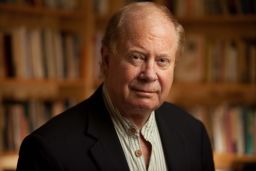Editor’s Note: Joseph J. Ellis is the author of many works of American history, including the Pulitzer Prize winner “Founding Brothers: The Revolutionary Generation” and “American Sphinx: The Character of Thomas Jefferson,” which won the National Book Award. His most recent book, “The Quartet: Orchestrating the Second American Revolution,” is out in paperback from Vintage Books. The opinions expressed in this commentary are solely those of the author.
Story highlights
Joseph J. Ellis: Martin Luther King Jr. said the arc of moral universe bends towards justice
Trump a reminder that King's racial rainbow is an arc that still lies beyond horizon, he says
The Rev. Martin Luther King Jr. liked to claim that the arc of the moral universe bends towards justice.
Over the long span of America’s often-racist history, you can make the case that King was right, but each lurch forward generates a reaction, transforming the arc into a sine curve.
Just as the end of slavery in the Southern states after the Civil War and Reconstruction produced the Jim Crow era, the election of the first black president has now produced the election of Donald Trump.
The United States has entered another backlash chapter, and we can probably expect more of them to occur over succeeding decades as we approach the demographic fault line where whites become a statistical minority in this country.

There were, to be sure, factors other than race at play in the election. Historically, it is difficult for a two-term president to be succeeded by a candidate from his own party. It has happened only twice before, in 1836 (Andrew Jackson-Martin Van Buren) and 1988 (Ronald Reagan-George H.W. Bush).
Media coverage of the campaign, driven by an entertainment agenda, abandoned any journalistic responsibility to serve the public interest and thereby enabled the most unqualified presidential candidate in American history to evade exposure.
It is also difficult to know how many voters found it impossible to endorse a woman president, especially when she carried political baggage that gave misogyny an easy outlet.
Finally, globalization and technology have left large segments of the working class behind, and this election became a catharsis and Trump the vessel into which they poured their hopes for salvation.
But race was the deepest and defining issue of this campaign. It was the coded message in Trump’s slogan “Make America Great Again” embodied in his stigmatizing of Hispanics as rapists and Muslims as likely terrorists, his dog whistles to white supremacists, his mainstreaming of blatantly racist language previously confined to the margins of American society and last heard at the national level in George Wallace’s segregationist campaign in 1968.
White males, especially those from rural regions without college degrees, are the core of Trump’s constituency. They have been the centerpiece of the Republican coalition since the civil rights movement drove them out of the Democratic Party. Trump mobilized them more effectively than ever before by making more explicit appeals to their prejudices.
Race also explains one of the otherwise confounding contradictions that Thomas Frank first diagnosed in “What’s the Matter with Kansas?”; namely the way so many working-class whites who stand to benefit from government programs such as the Affordable Care Act and more progressive tax policies vote against their own economic interest by resolutely opposing all such federal initiatives.
The reason is that race trumps(!) class in their cultural calculations since any government policy that redistributes resources across the population disproportionately benefits blacks and Hispanics, an outcome they find intolerable.
Trump’s most ardent supporters are likely to suffer if and when he dismantles the Affordable Care Act, implements his tax cuts for the wealthy and initiates a trade war with China, but they are unlikely to make the connection. Hillary Clinton was wrong to call them “deplorables,” but they do occupy a mental universe that lies beyond rational analysis.
Despite the unquestioned gains of the civil rights movement, which made outright expressions of racism politically taboo, Trump’s election has exposed the abiding existence of a deep pool of racial prejudice beneath the surface of American society.
It has been there throughout our history, and each time we move closer to a genuinely multiracial version of the American Dream, it bubbles back to the surface.
Trump tapped into it with great rhetorical dexterity, thereby reminding us that King’s racial rainbow is an arc that still lies beyond the horizon.









































